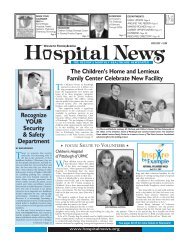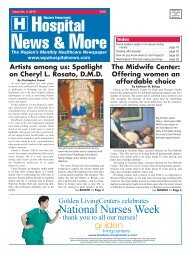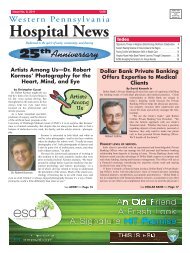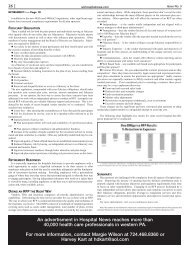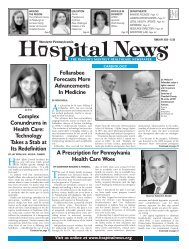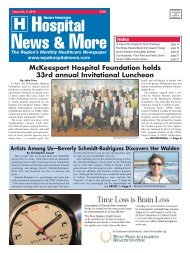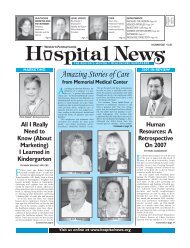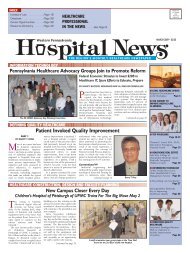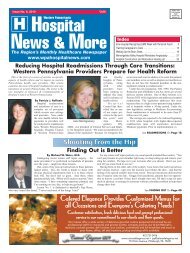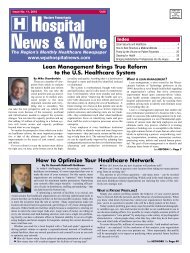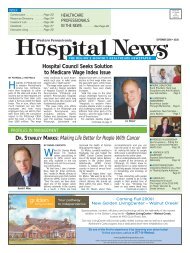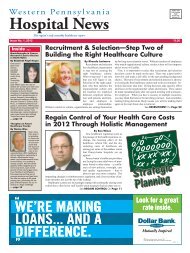8| wphospitalnews.comIssue No. <strong>10</strong>How You Can Help PatientsWho Can’t WorkBy Dennis Liotta, Esq.In this troubled economy, the Social Security Administrationis being barraged with benefit claims. Jobs are fewand far between for relatively healthy workers, but whatabout people who suffer from a physical or mental conditionthat prevents them from working?Social Security disability (SSD) benefits are the answer.However, applying for SSD benefits is a long and complicatedprocess. After all of the time and effort involved inthe application process, there’s no guarantee of a reward -the government denies over 3/4 of all claims, even whenpatients deserve them.As a healthcare professional, you may encounter people with disabilities whoare overwhelmed and desperate for resources. It’s stressful enough to deal with aserious medical condition, let alone no paycheck coming in and bills piling up. Youcan help guide the people in your care on how to navigate the system.WHO IS ELIGIBLEIf a patient can answer “yes” to the following questions, they may be eligible forSSD benefits:l Do you have a severe physical or mental condition that prevents you fromworking?l Do you have a disability that prohibits you from working in any capacity - notjust in the job you held previously?l Has your disability lasted - or is expected to last - for at least one year? Or, isthe disability life-threatening?l Do you have an earnings record that shows you have paid into the Social Securitysystem within the past five years? People with a limited or nonexistent workhistory may be eligible for Supplemental Security Income benefits (SSI).Legal UpdateAPPLYING FOR SSD BENEFITSTo get started, contact the Social Security Administration at 1-800-722-1213,visit www.ssa.gov to file online, or make an appointment at a local Social SecurityDistrict Office. The SSA reviews medical records provided by you or other healthcareproviders, as well as the patient’s monthly earnings, his or her condition(s),and other information.Patients can apply for benefits as soon as they become disabled. If they are approved,SSD benefits don’t kick in until the sixth full month of disability. Becausethe claims process takes at least 120 days and up to two years to appeal a deniedclaim, I recommend applying as soon as possible. In fact, at our law firm it’s notuncommon to represent someone for a personal injury claim and at the same time,help them to apply for SSD.If approved, SSD payments are retroactive from the date a healthcare professionalevaluates a patient as disabled. Money is based on average top earnings over thepast 15 years of work history.Nothing can happen without a diagnosis and proof that the patient suffers froma disability severe enough to prevent him or her from working. Also, it’s criticalthat patients attend their medical appointments. And this is key: encourage themto follow through with their treatment plan.NEXT STEPS IF A CLAIM IS DENIEDIf a patient talks with you about applying for SSD or SSI benefits, remind himor her that the government denies the majority of claims. But this does not meanthey should give up. While anyone can represent themselves at an appeal hearing,they should consider contacting an experienced attorney to help them navigate thesystem.It’s important to know that there is a 60-day window to appeal a denied claim.You can reapply after that time period, but the process starts all over again. Theprocess for appealing the denied SSD claim includes a hearing, which can take upto two years. Typically it takes a judge several months to issue a decision. If a patientdisagrees with the judge’s decision, he or she can move on to the Appeals Council.The last possibility is to pursue a case in Federal Court, which requires the assistanceof an attorney.As a medical professional, being knowledgeable about the system can help youunderstand the nuances of government agencies that provide financial support forAmericans, enable you to connect with a patient’s medical situation, and ultimatelyeven help them improve their quality of life.Attorney Dennis Liotta, a partner at the law firm of Edgar Snyder & Associates, hasover 20 years of experience and helps people with physical and mental disabilitiesget Social Security disability (SSD) benefits. For a comprehensive overview of SSD,visit www.EdgarSnyder.com.“Nothing we doto defend the human person,no matter how small,is ever unfruitful or forgotten.”~ Archbishop Charles Chaput,O.F.M., Cap.Choose to live a life that matters.Ea ach day ourteam is blessed to meet people whowelcome us intotheir lives as they journey along a pathwhereemedicine and medicaltechnologyno longer holdsa cure,and thereforeethey seek comfort measuresuntila naturaldeath occurs.This sacredtime will only comeonce in a lifetime andwe feel privileged to meet theseindividuals FacetoFaith.As the area’sonlypro-life hospice, we prayespecially during October,“RespectLife Month,”thatour messagewill encouragecommunity members tohold in high regardallstages of human life-from our birth as babiesuntil w e pass from thislifeinto life eternal.©<strong>2011</strong>CHCatholicHospicewww.catholichospicepgh.org Serving people of all faiths1.866.933.6221
Issue No. <strong>10</strong> wphospitalnews.com| 9From Secret Survivor to Active Advocate: Marina Posvar Givesa Voice to Cancer Survivorsby Elizabeth Pagel-HoganWhen Marina Posvar was going through treatment forher first diagnosis of cancer in 1994, she refused to appearon TV and would only talk via phone when themedia wanted to interview her about her diagnosis. Thehot topic was the groundbreaking BRCA1 and BRCA2research that estimated a person’s cancer risk based onthe presence of these genes. Even though Posvar testednegative for “the breast cancer gene” she was too concernedthat people knowing she had cancer might impacther future employment and her health insurance.The research study, conducted while Posvar was intreatment at Georgetown Lombardi Comprehensive CancerCenter in Washington DC, focused on the AshkenaziJewish population, but according to the National CancerInstitute, the implications of testing positive for thesesuspected cancer-causing genes were widespread andalarming. The Health Insurance Portability and AccountabilityAct (HIPPA) wouldn’t come into existence for anothertwo years, so genetic information in someone’smedical records was fair game for employers and healthinsurance agencies, and almost certainly cause for denyingcoverage. Even today, HIPPA doesn’t protect this informationfrom being accessed by life insurance,disability insurance and long-term care insurance.Posvar’s feelings about publicity and her cancer experienceare at the opposite end of the spectrum today.Now a two-time breast cancer survivor, she has a leadingrole as a volunteer advocate in the American CancerSociety’s Cancer Action Network for<strong>Pennsylvania</strong> and works at Hillman Cancer Center inthe Gumberg Family Patient and Family ResourceCenter as a Patient Navigator.“Being a survivor does makes me uniquely positioned,”Posvar states. “I can listen, comfort. SometimesI’ll say, ‘I know, I’ve been in your shoes.’ All ofsudden the person realizes that I really do get whatthey are saying.”Her treatment and employment experience has paralleledthe changes in the cancer experience in general.She joined Hillman Cancer Center in 2002, rightbefore it opened .“Originally I was to help the patients but was alsohelping with volunteers and with development,” recallsPosvar. After a year or two, Dr. [Ronald] Herberman,then the Director, wanted to establish apatient navigator program. “I did a lot research onhow to implement navigation but it’s different everywhere.In some cases it’s a social worker, helping peoplewho are underserved and uninsured. Then thereare nurse navigators who will coordinate everythingand help the patient through their treatment, but thetime required is intense.”Posvar and four volunteers who help when they cancomplete over 700 monthly courtesy calls to new patientsand families.“They are coming to Hillman for the first time, eitherunsure why they are coming or having just beendiagnosed. They are coming to this huge place, this‘cancer place’ and so many are just freaked out aboutcoming, we call and try to make them feel not lost.”Lost was how she felt during her first diagnosis.“I didn’t know what I was facing. I didn’t knowwhat I was up against. I asked the nurse what I shouldexpect from the chemo and even she couldn’t tell me,”Posvar remembers. But she wasn’t going to kiss lifegoodbye.“I remember at Lombardi I had to walk through pediatriconcology to get to my treatment area. I wouldbe dreading it, feeling sorry for myself. Then I wouldsee these kids with no hair, running around smilingand laughing, and I would get strength.” Later, Posvarwould participate in community events that collectedtoys for the treasure box in that same pediatric unit.“I had no guidance, no education. But sometimesyou have to be your own advocate. I would go and parkmyself in the bookstore and just read. I know now therewas information from places like the American CancerSociety but no one shared it with me.”Posvar did eventually learn about some supportiveservices, and now chooses to spend a lot of her free timeon the legislative advocacy forefront.“I am not politically inclined. But I didn’t realize howmuch healthcare and the patient experience is in greatpart determined by our government,” Posvar said. “I alsodidn’t know how approachable our elected officials are.Whether or not you like the affordable healthcare act,there are things that are directly related to the experiencesof people with cancer.”Posvar feels the legislation to help people with cancerand the services like a Patient Navigator are showing improvementin the right directions. But there are alwayspeople that are missed.“So much is up to the patient; how much help do theywant. I can be available, saying hello, visiting them intreatment, but if someone doesn’t want to ask for help,you can’t force them,” Posvar said. “Sometimes all I cando is start talking. I learn about their needs through thecaregiver sharing how stressed out everyone is. But oftenthey don’t know the services that are available, the therapistsand social workers we have. They don’t ask.”When they do ask, she is ready to help. Posvar hasMarina Posvar presenting an award toCongressman Mike Doyle at en event in 2009for his work supporting legislation to helppeople with cancer.taken on many tasks, like yelling at taxi services that keptpeople waiting, finding accommodations for families thatneeded temporary lodging and accepted huge dogs, andfinding a wheelchair for a family with virtually no moneyto transport their loved one at the end of his life.“It’s so complicated. I wish i could reach more people,”Posvar says.For more information, visit www.acscan.org.Lake Erie College of Osteopathic MedicineBrings a New Level Of Medical Education toSouthwestern <strong>Pennsylvania</strong> - LECOM at Seton HillThe Lake Erie College of Osteopathic Medicine leadsthe nation in meeting the challenges of 21st Centuryeducation with quality training for medical andpharmacy students. LECOM provides that educationat an affordable price with innovativestudent-centered pathways.LECOM is the nation’s largest and most progressivemedical college and continues to grow to meet thedemand for physicians and pharmacists. Ourstudents experience medicine that considers thewhole person – medicine that partners with itspatients. They learn to practice medicine above andbeyond.Greensburg, <strong>Pennsylvania</strong>(724) 552-2880Erie,<strong>Pennsylvania</strong>LECOM.edu(814) 866-6641Bradenton, Florida(941) 756-0690



